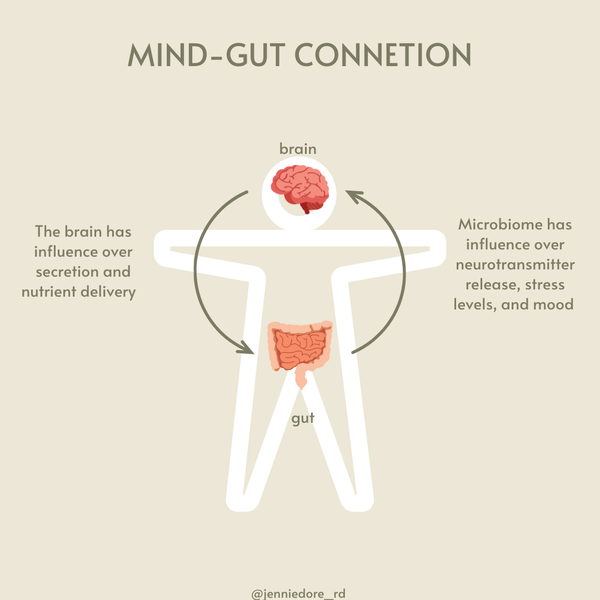18 Jul Your Second Brain
We’ve all gotten butterflies in our stomach and “gut feelings.”
These sayings are biologically based!
Our gut works in a network between all other systems within the body. It communicates to the immune system, endocrine system and even the brain. The mind-gut connection is one of the most important and novel connections found within the body to impact our overall wellbeing.
THE SCIENCE
The gut is directly connected to the brain through the vagus nerve. This nerve acts as a two way street where the food we eat effects our mood and our thoughts affect our digestion.
Because of this connection, many scientists have termed our gut our “second brain” and has a larger influence on our overall health.
This connection makes more sense when we think about emotional eating and how when we experience strong negative emotions
anxiety
fear
anger
it can result in GI upset.
This is because when we are stressed or feeling emotional (anger, frustrated) while eating, our body is put into a sympathetic “fight or flight” mode. This response brings blood supply and oxygen to our muscles and extremities, and away from the stomach.
Our body becomes more focused on fighting off a threat (surviving) and less effort into digesting our food. With this comes stomach aches, bloating, inflammation in the gut.
These negative changes in the GI tract feed back to the brain where we see this cycle perpetuate.
This is why our gut health is so important to pay attention to!
It’s not just about the foods you eat, it’s also HOW you eat.
Tips to improve digestion and mind-gut connection
1. Eat relaxed sitting down.
When we sit in a relaxed position our body transitions into a parasympathetic “rest and digest” phase that promotes proper digestion.
2. Avoid arguing or fighting while eating.
Remember that our gut can hear our brain. When we are angry and stressed our gut knows that and will react accordingly.
3. Eating foods such as omega-3 fats, fermented foods, and high fiber foods.
All of these foods introduce healthy sources of prebiotics and probiotics that help your gut flourish. The fiber sources are the prebiotic or food for the probiotic bacteria. Fermented foods promote the healthy gut bacteria, the probiotics. The intermix of both is important.
4. Eat Mindfully
When we are present and aware of our eating experience, we eat slower and more relaxed helping to maximize digestion AND absorption (using the vitamins and minerals from the macronutrients you are eating). Mindfulness has also been shown to improve mood and have an overall positive affect, indirectly aiding gut health!
Other approaches to Mind-Gut alliance:
1. Meditation
2. Breathing Exercises
3. Yoga
A happy gut is a happy mind, a happy mind is a happy gut 🙂



